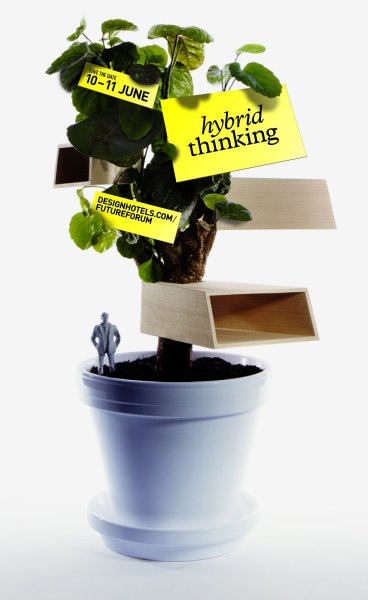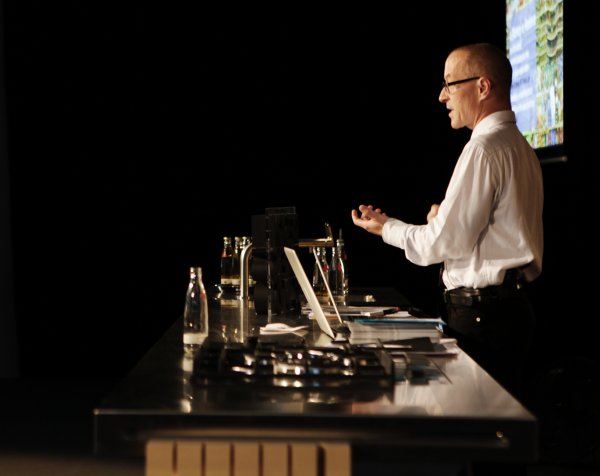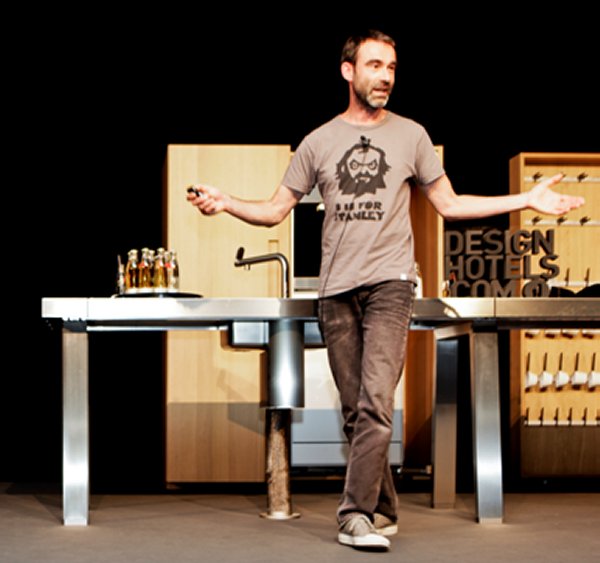The hybrid thinker will question everything in future and balance trends
 |
|
Berlin (July 9, 2010). Everything today is hybrid - from the car to the contract. And now, it seems, so too is the human being. He or she has become a hybrid thinker. After two decades of standardisation and controlling, the hybrid thinker finally puts paid to copycats and benchmark junkies. The future is concerned with the following question: Can things be seen and shaped differently in future? The new power is in seeing, feeling, smelling and forming, in questioning and redefining. David Bosshart, CEO of the Gottlieb Dudweiler Institute (GDI) in Zurich, and Robert Thiemann, Editor in Chief of the design magazine "Frame" in Amsterdam, attempted to describe the new ways of thinking whilst speaking at the Design Hotels "Future Forum" in Berlin. This turns almost everything on its head.
In future, there will be no more either-or thinking, but everywhere there''ll be an "and", David Bosshard said. Function and design will be questioned: logic + empathy, reality + virtuality, history + arguments, science + fiction, creativity + substance, details + overviews. mega-trends + counter-trends will be balanced out.
Speaking less abstractly, this means that traditional mental boundaries should be surmounted, conventions should be questioned and thinking should be much more broad. Artists and designers set the beat. They have long since moved their focus away from galleries but have designed shops, created household products and new club concepts. They fuse materials, techniques, forms and functions in order to create a new breed of products.
Sewing in the café and working at home
Thiemann gave the 10 Corso Como in Milan as an example: Since 1990, this has formed into a hybrid mix of fashion, design, bookstore and art for sale. In 1998, a café restaurant was added, and in 2003 a three-room hotel. The hybrid mix of "lifestyle stores" was complete. There are meanwhile many examples of such businesses across the globe: Businesses have been integrated into museums; pasta shops are combined with jewellery businesses and sewing work in cafés.
"The hybrid thinker''s approach is to cross ideas". "Cross breeding" is what it''s about. Retail is much further ahead here than the tourism or hotel industry: Applications have been developed for mobile phones, for instance, allowing the user to order goods. Job descriptions are also changing: The internet and the mobile phone make workers mobile so that they can work independently of time and space - for instance, at home. It''s not presence in the office that counts, it''s now about meeting deadlines and completing tasks. Business and leisure are merging more and more.
 |
|
| David Bosshart: Hybrid thinking will influence the future. |
Hybrid thinking knows no bounds
In the hotel industry, condominiums and serviced apartments are the first results of such thinking: The apartment user is able to make use of hotel services. Health care institutions are also beginning to offer hotel services; restaurants are springing up in museums and chain restaurants and hotels are establishing themselves in art galleries.
The Design Hotels "Future Forum" took place in the "Bikini House" in Berlin''s Zoobogen, directly adjacent to the entrance to the zoo. This dilapidated group of buildings will be put back to use as hybrid ensemble: By 2012, it is to contain a mix of top restaurants, retail, wellness, offices and a hotel. The high point is to be a 7,000 sq.m. terrace looking out on to Berlin Zoo.
Hybrid thinking covers all elements of life and day-to-day activity. Having "hybrid capital" means that not only equity and not only debt is available; hybrid business models combine products and service components rights from the very start; hybrid software functions on various systems, hybrid science know no stable generational succession.
The context redefines hospitality
Man is therefore challenged to reassess basic behaviour – his learned behaviour. He speaks several languages or should at least accept others, he thinks in an transdisciplinary way and as such also considers how others think; he''s curious and thirsty for knowledge. "Hospitality is to redefine itself," David Bosshart went on, "it inspires trust, a feeling of being at home in a strange place."
 |
|
| Robert Thiemann: The hybrid thinker is a bastard. |
In a hospitality context, hybrid thinking is only successful where a hotel can be incorporated in a credible fashion: "Local" hotels must also be known to every neighbour and the neighbours must identify with the philosophy and the events of the hotel – in short, it must be culturally plausible both within and outside its four walls. In terms of technology, much can be done in the hotel industry, but does the machine really serve human needs? Here, human control is required for the wellbeing of guests. Hospitality must also be sustainable: The winner is the one planning these activities for the long-term and who can demonstrate improvements.
In the hybrid mind, modes of thinking and perspectives are constantly changing. Just as the virtual world is encroaching further into the real world and the real world is becoming more virtual. "The virtual world sees what''s happening in the real world in real time," David Bosshart summarises. / map
To print this article you have to be registered and logged in for newsletter, visitor or subscription.





